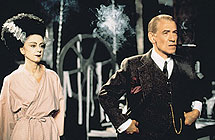|
|
|
|
Gods
and Monsters
|
 |
|
Gods and Monsters is an overrated film. It cagily taps into a number of contemporary arthouse audience interests – excavation of a gay artist's career, the truth behind a Hollywood legend, an impossible romance, the mythic status of popular culture. But the resulting mush is simply infuriating. This is ostensibly a biopic of James Whale, director of (among other remarkable works) Frankenstein (1931) and Bride of Frankenstein (1935). According to Alberto Manguel (in his BFI Classic book on the latter movie), Whale was a stylist with "a keen sense of the absurd, the outrageous and the camp". He led an openly gay life, but was never a scandalous news item; his death remains a low-key mystery. The film tracks Whale (Ian McKellen) in his twilight days, with his glorious career well behind him. When he is not being assailed by vivid, flashback recollections, or trading affectionate banter with his stern, German maid (Lynn Redgrave), Whale exercises his erotic predilection by fixing upon a young, hetero hunk, Clayton (Brendan Fraser). In the era of queer cinema, this is a surprisingly retrograde depiction of unrequited gay passion. The film harps pruriently on the supposedly predatory, perverse, death-driven nature of Whale's yearnings, until it decides that writing sexuality out of the picture altogether would be a more acceptable approach. It is a pathetic and evasive compromise. Even as an old-fashioned, romantic melodrama akin to Luchino Visconti's Death In Venice (1971), this is a creaky, poorly directed film. Every flashback is cued via some heavy-handed transition. Attempts at visual metaphor and dramatic irony are clunkily inserted. McKellen is undeniably good as Whale – although it is the kind of ultra-mannered, show-off, hyper-British performance designed to win awards rather than complement an ensemble. Before this film, writer-director Bill Condon had been involved in a number of fair to middling horror movies, including Sister, Sister (1987). Gods and Monsters presumes to offer a highbrow commentary on the horror genre, its true meaning and origin. But the lesson is terribly banal. No justice is done to the legacy of Whale's Frankenstein films to baldly claim that they reflect the horrors that the director experienced in the trenches of World War I, or that the monster functions as a covert symbol for outcast homosexuality. Condon never gets beyond a tabloid-style flagging of these gross propositions. The film is no better with its smaller details. The everyday world around Whale seems more like the mid '70s than the late '50s. It is hard to believe that a camp moviegoer of the period would describe Whale's creations as "pop culture icons"; or that ordinary bozos in a bar would revel in the supposed trashiness of Whale's work in exactly the way that retro-cultists do today. Such sloppiness speaks volumes about the supposed arthouse quality of Gods and Monsters. MORE showbiz biopics: Auto Focus, The Life and Death of Peter Sellers, De-Lovely © Adrian Martin June 1999 |
![]()